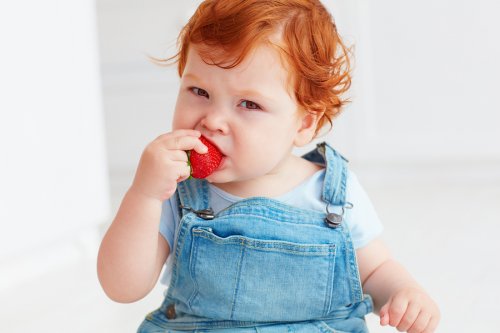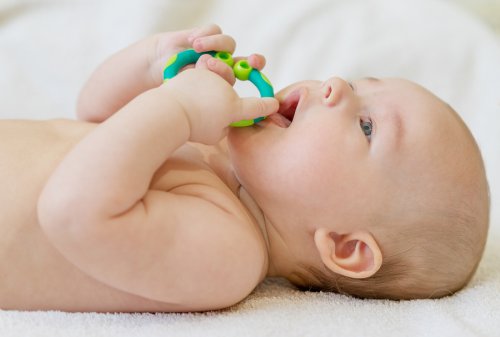What to Do If Your Baby Drools a Lot

An excess of saliva and drooling is normal in babies. This is because they haven’t learned to swallow their saliva yet. While newborns don’t produce a great deal of saliva, after 2 months, babies begin to drool even more.
At this age, babies start to suck and chew on everything, and saliva production increases without the baby even realizing it. Therefore, naturally, babies drool.
It all has to do with little ones’ swallowing system. When babies drink, they use the muscles in their mouths to suction and swallow. However, saliva production is automatic and remains in a baby’s mouth until it overflows.
Baby bibs are a great tool if your baby drools a lot. They help keep your baby’s chest from getting wet and also help them stay warm. We need to also pay attention and be sure to keep our baby‘s mouth dry to avoid possible irritation.
My baby drools a lot… When should I start to worry?
When a baby has a cold, it’s normal for drooling to be excessive. If you notice this change though your baby isn’t sick, then you should consult your pediatrician.
If a baby’s drooling lasts for a long time, then it may mean there’s a problem in the nervous system. As a result, your baby is unable to swallow properly.
If your little one has difficulty eating and drools a lot, it may mean it hurts when he or she swallows. The cause is generally a viral infection that produces pain or sores in the mouth.

“In general, children drool until about the time they reach 18 months of age, though this may vary.”
If your child drools a lot, he or she runs the risk of getting choked up frequently or having constant nausea. It can also cause your child to have respiratory difficulties. In either of these situations, it’s important you stay calm and take your child to the pediatrician to rule out any illness.
Finally, it’s also important to remember that babies have an immature swallowing reflex and this can last for some time.
Is teething the only reason my baby drools so much?
Clearly, one of the main reasons that babies drool excessively is because of their teeth coming in. While they may take some time to appear, the cores of a baby’s teeth begin to move around in the gums at around 2 months.
Saliva contains enzymes, which help combat certain infections. This is why saliva production increases as soon as your little one’s first tooth comes in. At this point, your child will likely benefit from a teething ring. These are useful tools for providing relief from sore gums – however, they also trigger saliva production.
At the same time, one of the first things small babies discover are their hands. And once they do, they start putting them in their mouths. This allows them to discover new sensations. By playing with their hands, babies stimulate saliva and start to drool.
This habit is beneficial when babies start to eat solid foods. For example, they grasp their foods and put them in their mouths as a means of exploration. Little by little, they learn to eat solid foods on their own.
Of course, when babies start to chew on their fingers and play with their tongues, this stimulates salivation. Saliva is a key part in softening foods and swallowing them.
Infants tend to bite using the area of their gums where teeth are coming in. This region tends to appear swollen and red. Salivation is quite pronounced and necessary at this stage, as it keeps the area hydrated and prevents infection.

Saliva and eating
The new flavors and sensations that babies experience when they start to eat solids stimulate their taste buds. This also causes little ones to salivate more than normal. The role of saliva, in this case, is to lubricate and help foods make their way to the stomach.
You should pay special attention to your child’s drooling if it goes beyond what you think is normal. In general, children drool until about the time they reach 18 months of age, though this may vary. It all depends on your child’s individual developmental process, his or her acceptance of solid foods, and teething.
That being said, there’s no need to become alarmed. Always keep a bib or burp cloth on hand as well as a pacifier or teether to help your baby through this stage. Calmly discover and enjoy this phase in your little one’s infancy. Remember, every moment in your baby’s life, whether good or bad, is unique.
All cited sources were thoroughly reviewed by our team to ensure their quality, reliability, currency, and validity. The bibliography of this article was considered reliable and of academic or scientific accuracy.
- Castañeda, A. A. H., & Moya, G. C. A. (2012). Características y propiedades físico-químicas de la saliva: una revisión. Ustasalud, 11(2), 102-112. http://revistas.ustabuca.edu.co/index.php/USTASALUD_ODONTOLOGIA/article/view/1123/922
- Cisneros-Lesser, J. C., & Hernández-Palestina, M. S. (2017). Tratamiento del paciente con sialorrea. Revisión sistemática. Investigación en Discapacidad, 6(1), 17-24. https://www.medigraphic.com/pdfs/invdis/ir-2017/ir171c.pdf
This text is provided for informational purposes only and does not replace consultation with a professional. If in doubt, consult your specialist.








